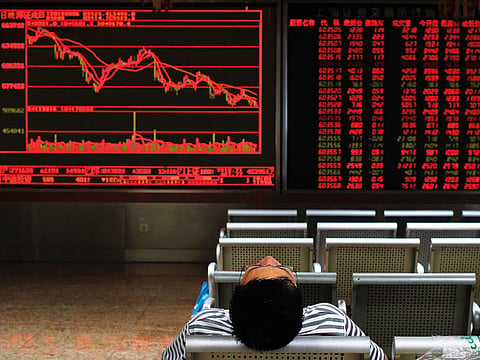Emerging market equities hit; rupee at all-time low
The MSCI index shed 19.7 per cent since the start of January, nearing the bear market territory

Dubai:
First currencies in emerging markets were hit, now the focus has shifted to equities.
The Turkish lira and Argentine peso were hit as stronger dollar adversely impacted the countries’ macro fundamentals, triggering concerns of contagion on other currencies, and asset classes. On Thursday, the MSCI emerging market index extended losses to hit its lowest level in fourteen months, nearing the bear market zone.
The MSCI emerging market index traded 0.13 per cent lower at 1,020.43 after hitting a low of 1,018.46, nearing the lowest level since July 2017.
“Macro fundamentals are under pressure in emerging markets due to a squeeze in dollar liquidity and recovering oil prices for all oil importing countries. When the going is tough for the macro, equities are one of the asset classes which reflect the sentiment more quickly,” Mohammad Shabbir, fund manager at Saudi Kuwaiti Finance House told Gulf News.
The index has shed 19.7 per cent since the start of January, nearing the bear market territory.
“Trade tensions are not the only factor dragging emerging currencies lower against the dollar. It’s the end of Quantitative Easing and a decade of near-zero interest rates that are hitting emerging markets and expect the situation to become even worse if the US Federal Reserve doesn’t slow down the tightening of its monetary policy,” Hussain Sayed, Chief Market Strategist at FXTM said.
The Federal Reserve is expected to continue on its path of further rate hikes, which may further strengthen the dollar, making emerging markets more vulnerable.
Elsewhere, the Indian rupee touched a fresh all-time low of more than 72 to the dollar. It hit a low of 72.1050, before closing at 71.9875.
“With India importing a large swathe of its fuel needs, rising oil prices will naturally lead to a higher dollar bill, which in turn will naturally weaken the rupee. With world matters unlikely to see any concrete solutions soon, we believe that the rupee could weaken a bit more against the US dollar,” Adeeb Ahamad, Managing Director, LuLu Financial Group said.
The Indian rupee has shed more than 12 per cent so far this year.
Other currencies however stabilised. The Turkish lira was up 0.21 per cent to 6.5875 against the dollar, while Argentine peso was down 2 per cent.
Regional impact:
The weakness in emerging markets was also seen in regional indices like Saudi Arabia’s Tadawul and the Abu Dhabi Securities Exchange index, which have been outperformers.
Saudi Arabia’s Tadawul index extended losses after losing 3 per cent in the previous session. The Tadawul index closed 0.41 per cent lower at 7,687.76, after hitting a low of 7,552.47, the lowest since six months.
“It doesn’t appear to be selling driven by local fundamentals, and was mainly caused due to emerging market woes. The possibility of a further drop can’t be ruled out,” Shabbir said.
The Tadawul index has gained 6.30 per cent so far in the year, compared to 9 per cent rise in the Abu Dhabi Securities Exchange general index.
“Saudi will recover faster than other markets due to local institutional participation,” Shabbir said.
Elsewhere in the Gulf, Dubai Financial Market General index closed 0.29 per cent higher at 2,826.60, bucking the weak regional trend.



